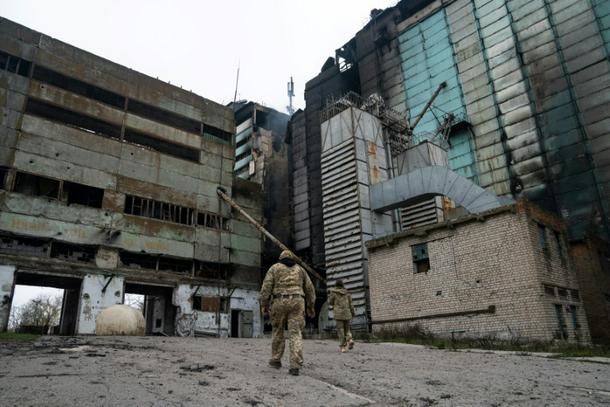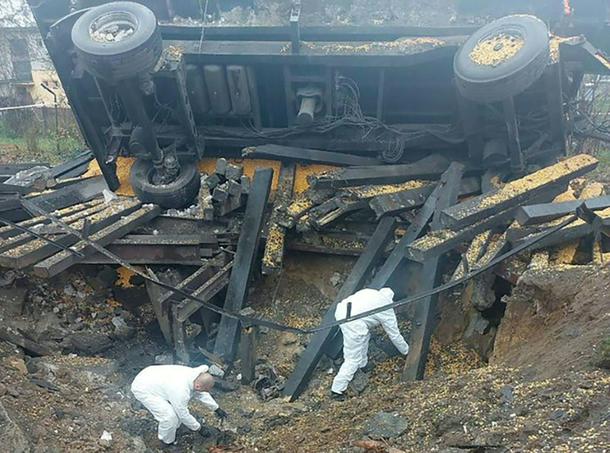
Following Russia's withdrawal from Kherson, Ukraine says it has uncovered torture chambers
Przewodow (Poland) (AFP) - Western leaders moved to calm fears of a dangerous escalation in Russia’s war in Ukraine on Wednesday, saying a missile blast in Poland was likely an accident, while Kyiv pushed back hard at the idea that its anti-aircraft fire was to blame.
Ukrainian leader Volodymyr Zelensky pointed the finger at Russia, but the United States, like NATO, firmly supported Warsaw’s assessment that the deadly missile was probably fired by Ukraine.
The missile killed two people when it struck the village of Przewodow near the Ukrainian border on Tuesday, shocking NATO member Poland.
Both Warsaw and NATO have said the explosion was likely caused by a Ukrainian air defence missile launched to intercept a massive Russian barrage targeting civilian infrastructure – while stressing Moscow was ultimately to blame for starting the conflict.

A picture taken by Polish police shows forensic officers gathering evidence under a farm vehicle destroyed in a deadly missile blast in the country's east
The White House said it had “seen nothing that contradicts” Poland’s preliminary assessment – while also declaring that “the party ultimately responsible for this tragic incident is Russia”.
President Zelensky, however, said Kyiv had seen no proof the missile was Ukrainian, demanding to be part of any investigation and asking for access to the blast site as well as “all the data” on the projectile.
“I have no doubt that this is not our missile,” Zelensky said. “I believe that this was a Russian missile, based on our military reports.”
In the immediate aftermath, the incident sparked fears of a major escalation in the Ukraine conflict, with Hungary criticising Zelensky’s denial as setting “a bad example”.
But by Wednesday, Polish President Andrzej Duda called it an “unfortunate accident”, saying that while the projectile likely originated from Ukraine’s air defences, the blame lay with Russia because of its attacks.
“Nothing indicates that this was an intentional attack against Poland,” said Duda.
- Russia ‘bears responsibility’ -
EU diplomats meeting in Brussels praised Warsaw, one of Ukraine’s closest friends and Russia’s fiercest foes, for its measured response.

NATO Secretary General Jens Stoltenberg said an ongoing investigation was expected to find that a missile blast in Poland was likely caused by a Ukrainian air defence missile
After crisis talks, NATO chief Jens Stoltenberg said “this is not Ukraine’s fault”.
“Russia bears ultimate responsibility as it continues its illegal war against Ukraine.”
Stoltenberg said NATO had ramped up its defences along its eastern flank in response to the war in Ukraine and denied that the alliance’s air defences had failed.
The NATO chief said Poland had not invoked Article 4 of the Western alliance’s treaty, which would have obliged members to discuss whether “the territorial integrity, political independence or security of any of the Parties is threatened”.
NATO’s most powerful member, the United States, has hundreds of troops in Poland and leads the West in supplying weapons to support Zelensky’s government in Kyiv.
From Bali, where the G20 summit was held, US President Joe Biden said it was “unlikely” that the missile had been fired by Russia.
Moscow welcomed Washington’s “restraint”.

Map locating Przewodow in Poland
The Russian defence ministry said: “Photographs of the wreckage… were unequivocally identified by Russian military experts as fragments of a guided anti-aircraft missile of a Ukrainian S-300 air defence system.”
It insisted that its own strikes, involving scores of missiles, “were carried out on targets only on the territory of Ukraine and at a distance of no closer than 35 kilometres (about 20 miles) from the Ukrainian-Polish border”.
The explosion rocked the village of Przewodow in eastern Poland at 1440 GMT on Tuesday.
“I’m scared. I didn’t sleep all night,” Anna Magus, a 60-year-old elementary school teacher, told AFP near the scene.
- ‘War crime’ -
Russia invaded Ukraine on February 24 and still holds swathes of territory despite a series of recent battlefield defeats.
The conflict has caused deep unease in neighbouring Poland, which shares a 530-kilometre (329-mile) border with Ukraine and where memories of Soviet domination remain raw.
The explosion came after a wave of Russian missiles hit cities across Ukraine on Tuesday, including western Lviv, near the Polish border.
General Mark Milley, the top US military officer, said the recent strikes may have been the heaviest of the war and condemned the targeting of civilian infrastructure.
“The deliberate targeting of the civilian power grid, causing excessive collateral damage and unnecessary suffering on the civilian population, is a war crime”, Milley said.
The strikes, which left at least one person dead in the capital Kyiv, caused widespread power cuts in Ukraine as well as in neighbouring Moldova.
The blackouts temporarily cut Europe’s largest nuclear power facility – Zaporizhzhya – as well as other, smaller plants from accessing off-site electricity.
“Yesterday’s power loss clearly demonstrates that the nuclear safety and security situation in Ukraine can suddenly take a turn for the worse, increasing the risk of a nuclear emergency,” Rafael Mariano Grossi, head of UN nuclear watchdog IAEA, said in a statement.
- Torture chambers -
Russia’s bombardment follows the withdrawal of its forces from the strategic Kherson region after an eight-month occupation.
In the recaptured territory, Ukraine said it had found numerous landmines as well as several sites that appear to have been used for torturing prisoners.
“The Russians kept local patriots who refused to cooperate with the enemy there in inhumane conditions. Kherson residents were interrogated and brutally tortured,” the Security Service of Ukraine (SBU) said.
At the sites, the SBU and police officials found objects indicating they had been used for torture.
“Eleven places of imprisonment were discovered, four of which show signs of being torture chambers,” said Ukrainian Minister of Internal Affairs Denys Monastyrskyi.
So far, 63 bodies had been found, he said.
“But we must understand that the search has only just begun, so many more torture chambers and burial places will be discovered.”
burs/lb/cwl